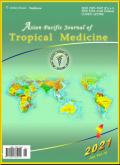父母对初级保健水平儿童不合理使用抗生素的行为和看法:一项来自土耳其的横断面研究
IF 1.6
4区 医学
Q3 PUBLIC, ENVIRONMENTAL & OCCUPATIONAL HEALTH
引用次数: 0
摘要
目的:了解到基层卫生保健机构就诊的家长对抗菌药物的认知情况、抗菌药物不正当使用频次及导致抗菌药物不正当使用的因素。方法:本横断面研究纳入973名申请初级保健中心的家长。我们分析了他们的孩子对抗生素处方、抗生素给药和抗生素耐药性的基本概念,以及父母对抗生素使用的知识和态度,以及他们在没有处方的情况下购买抗生素的经历、做法和看法。结果:近一年来78.9%的家长至少给孩子服用过一次抗生素,39.1%的家长给孩子服用过3次及以上抗生素。一些参与者(7.1%)报告曾强迫医生开抗生素,并在没有处方的情况下购买抗生素(13.2%)。抗菌药物知识和耐药性意识的知晓率较高;在拥有大学学历、较高收入水平、两个或更少孩子、社会保险和不良行为的父母中,从医疗保健专业人员那里获得抗生素信息的父母的不良行为较少。收入水平越高,无处方服用抗生素的概率越低(OR 0.460;95% CI 0.219-0.965),有3个及以上儿童的患者强制使用抗生素的概率更高(or 6.94;95% ci 2.37-20.26)。抗生素耐药意识子维度得分对强制处方行为有负向影响(OR 0.852;95% CI 0.732-0.993),但从行为子维度获得的分数正影响该行为(OR 1.136;95% ci 1.011-1.276)。结论:抗生素使用不当似乎是一个负面认知、缺乏知识和社会经济层面的问题。应开展研究,提高家长对抗生素的认识,扩大社会保险的范围。本文章由计算机程序翻译,如有差异,请以英文原文为准。
Behaviour and perception of parents on irrational use of antibiotics in children at primary care level: A cross-sectional study from Turkey
Objective: To investigate the perception of antibiotics, the frequency of inappropriate antibiotic use, and the factors that lead to inappropriate antibiotic use by parents who apply to primary healthcare organizations. Methods: This cross-sectional study included 973 parents who applied to primary healthcare centers. We analyzed basic concepts related to antibiotics prescribed for their children, antibiotic administration, and antibiotic resistance, as well as parents′ knowledge and attitudes towards antibiotic use, and their experiences, practices, and perceptions related to purchasing antibiotics without prescription. Results: In the past one year, 78.9% of the parents gave antibiotics to their children at least once, and 39.1% gave antibiotics three or more times. Some of the participants (7.1%) reported having forced the physician to prescribe antibiotics and purchased antibiotics without a prescription (13.2%). The knowledge about antibiotics and awareness about antibiotic resistance were found to be more frequent; among parents who had university degrees, higher income levels, two or fewer children, social insurance and negative behaviours were lower in those who received information about antibiotics from healthcare professionals. The probability of taking antibiotics without prescription was lower in that of with higher income level (OR 0.460; 95% CI 0.219-0.965), and the probability of forcing antibiotic prescription was higher in those with 3 or more children (OR 6.94; 95% CI 2.37-20.26). The score obtained from the awareness of antibiotic resistance sub-dimension was found to negatively affect the behavior of forcing antibiotic prescription (OR 0.852; 95% CI 0.732-0.993) but the score obtained from the behaviour sub-dimension was positively affect this behaviour (OR 1.136; 95% CI 1.011-1.276). Conclusions: Inappropriate antibiotic use appears to be a problem with negative perception, lack of knowledge and socioeconomic dimension. Studies should be conducted to increase antibiotic knowledge in parents and to expand the scope of social insurance.
求助全文
通过发布文献求助,成功后即可免费获取论文全文。
去求助
来源期刊

Asian Pacific journal of tropical medicine
PUBLIC, ENVIRONMENTAL & OCCUPATIONAL HEALTH-TROPICAL MEDICINE
CiteScore
4.00
自引率
9.70%
发文量
1936
审稿时长
3-8 weeks
期刊介绍:
Asian Pacific Journal of Tropical Medicine (ISSN 1995-7645 CODEN: APJTB6), a publication of Editorial office of Hainan Medical University,is a peer-reviewed print + online Monthly journal. The journal''s full text is available online at http://www.apjtm.org/. The journal allows free access (Open Access) to its contents and permits authors to self-archive final accepted version of the articles on any OAI-compliant institutional / subject-based repository.
APJTM aims to provide an academic communicating platform for international physicians, medical scientists, allied health scientists and public health workers, especially those of the Asia-Pacific region and worldwide on tropical medicine, infectious diseases and public health, and to meet the growing challenges of understanding, preventing and controlling the dramatic global emergence and re-emergence of infectious diseases in the Asia-Pacific.
The journal is proud to have an international and diverse editorial board that will assist and facilitate the publication of articles that reflect a global view on tropical medicine, infectious diseases and public health, as well as emphasizing our focus on supporting the needs of public health practitioners. The APJTM will allow us to seek opportunities to work with others who share our aim, and to enhance our work through partnership, and to uphold the standards of our profession and contribute to its advancement.
 求助内容:
求助内容: 应助结果提醒方式:
应助结果提醒方式:


